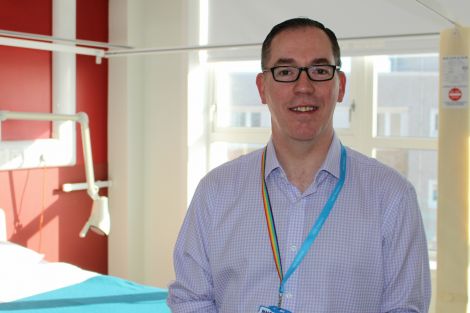Coronavirus / NHS chief: sticking with national guidelines is ‘safest way’ to tackle Covid-19
Risk will be difficult to manage “unless we’re ready to raise the drawbridge”, says Dickson.
CURTAILING travel in and out of the islands would be a “huge trade off” and sticking with national guidelines offers the quickest route towards ultimately being able to ease restrictions, according to NHS Shetland’s chief executive.
Michael Dickson was speaking during an online briefing with Shetland and Orkney journalists in response to calls from islands politicians for a debate on whether relatively low infection numbers could offer scope to liberalise the rules for islanders.
While he was “very sympathetic” with those seeking to find a way back to “a degree of what was considered normal previously”, he pointed to a fresh Covid-19 outbreak in Uist where 14 cases were recorded over the weekend and August’s cluster of cases in Aberdeen as examples of how swiftly the virus can spread.
“Are we willing to say we won’t have people coming into the islands, we won’t have people travelling from the islands to the mainland?” he said.
“Unless we’re ready to raise the drawbridge and say we’re going to be self-contained, the risk can become really difficult to manage. I think the debate is really healthy… [but] there’s a lot of presumptions that sit behind this. There isn’t an easy answer to it.”
When 10 cases were discovered relating to a fishing boat in Orkney a few weeks ago, they were in a “really distributed pattern across Orkney” and “if people had been going about their business [as usual] the virus would have spread very quickly”.
It is “easy to forget” the pandemic has seen over 30 million infected with Covid-19, resulting in at least one million deaths globally, he pointed out.
Dickson said NHS Shetland was working as part of a nationwide health service effort to minimise the spread of Covid-19 and he firmly believes that is “the safest possible way we can do it”, though he did acknowledge politicians had to balance that against the importance of keeping the economy going.
Become a member of Shetland News
Last week first minister Nicola Sturgeon re-imposed a ban, with some exemptions, on household visits. There is also much speculation that further restrictions, including the possibility of a so-called “circuit break” lockdown over the October holidays, could yet follow.
But Shetland Islands Council leader Steven Coutts is among the voices calling for talks with ministers “in quick order” to address the “disproportionate impact” the restrictions will have on remote and rural island communities.
“These are communities without access to cafes and meeting venues,” he told Shetland News. “Add the harsher weather and shorter days, and poorer, and often non-existent, broadband coverage and social isolation is a real serious health concern.
“We look at other island groups, and the different decisions they have made. There is no one island approach either. But the simple reality is that in Shetland we have not been afforded the opportunity to contemplate this.”
Shetland’s Covid-19 infection rate is among the lowest in the country. Three cases were recorded 10 days ago, but with 63 people asked to self-isolate by contact tracers, there have been no further cases since.
There have been suggestions that some or all of those three tests were “false positives”, but Dickson said that was definitely not the case and dozens of people would not have been asked to self-isolate had the cases been reclassified as negative.
Shetland and Orkney’s MSPs are due to meet Scotland’s health minister Jeane Freeman to discuss the possibility of localised easing of restrictions later this week.
Meanwhile, speaking ahead of a House of Commons debate on the coronavirus laws brought into place in March, Northern Isles MP Alistair Carmichael said students had been left “swinging in the wind” as universities returned earlier this month.
“It was surely foreseeable that there would be some sort of lockdown locally as a consequence, and it was surely foreseeable that for many young people there would be a greater need for mental health support in those circumstances.
“None of those measures has been put in place and I have tremendous sympathy for our students who have been left simply swinging in the wind,” Carmichael said.
He also raised concerns about the centralised approach of governments throughout the UK and called for local authorities to be given greater scope to “determine rules that work for them”.
Become a member of Shetland News
Shetland News is asking its readers to consider paying for membership to get additional perks:
- Removal of third-party ads;
- Bookmark posts to read later;
- Exclusive curated weekly newsletter;
- Hide membership messages;
- Comments open for discussion.
If you appreciate what we do and feel strongly about impartial local journalism, then please become a member of Shetland News by either making a single payment, or setting up a monthly, quarterly or yearly subscription.









